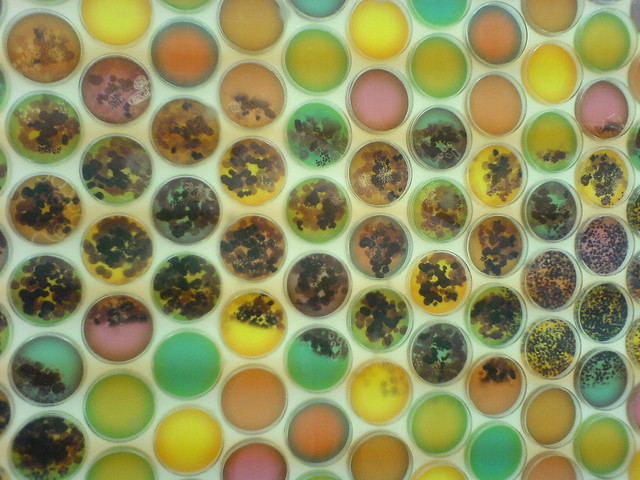
There is an exciting new frontier of research being conducted involving intestinal bacteria. Finally the scientific community has accepted what nutritionists have been saying for years… that the microflora in the gut is critical to good health.
We host about 400 -500 species of microorganisms in the gut of which only 80 species have been identified. There is so much to investigate: the different strains and their appearance, structure, function and behavior.
With new emerging technologies such as Multilocus Sequence Analysis, DNA Typing using PCR, Pulsed Field Gel Electrophoresis, and others with even more complicated names, researchers can actually identify the different strains, tag them, study what they do, what chemicals they secrete and how they affect the microbiome and ultimately how they affect human health.
Furthermore, once they are identified and their behavior is studied they may be used as therapeutic interventions which are targeted to very specific conditions. This is HUGE!
For example, there is currently a probiotic product which started out as an over the counter probiotic supplement. The manufacturers have supplied it to researchers and now it is available as a prescription at double the strength. By prescription it is used for the specific conditions of ulcerative colitis, and those with an ileal pouch. This product is an extremely high dose of 8 strains of bacteria which have been studied for these specific conditions and found to be ameliorative. This combination of friendly bacteria show a great deal of promise for use in the above two conditions.
There is also research associating specific gut bacteria with obesity and diet. There is so much to study when it comes to gut bacteria!
Many of the microbiota are friendly and these make lactic acid. The same lactic acid that we get when we ferment foods. Yogurt and kefir are good examples of the end product of lactic acid fermentation. Traditionally made sauerkraut and other fermented vegetables also provide plenty of friendly lactic acid bacteria. There are many foods that lend themselves to fermentation, and are part of the traditional, real food movement. Eating probiotic rich foods is an excellent way to nurture the growth of beneficial bacteria in the gut.
Before refrigeration was invented fermentation was the method used to preserve food. Humans reaped the benefits of this method by eating these foods and hosting the good bacteria. What do these beneficial bacteria do for us?
Gut bacteria have a big job:
1- Beneficial bacteria provide enzymes which aid in digestion.
2- Beneficial bacteria provide a protective barrier along the entire length of the digestive tract much like a thick layer of turf protecting top soil.
3- Beneficial bacteria provide antibiotic and antiviral substances for protection. Lactic acid bacteria enhance GI and systemic immunity in humans by:
- Increasing B cells which recognize foreign substance.
- Increasing phagocytic activity which works to destroy foreign matter.
- Increasing IgA, IgG, IgM and Secretory IgA which boast antibody activity.
- Increasing gamma interferon which enhances WBC ability to fight infections and disease.
4- Lactic acid bacteria produce SCFA (short chain fatty acids) such as butyric acid and proprionic acid. Importantly, these organic acids lower the ph in the GI tract, making it more acidic which reduces the growth of pathogenic bacteria.
5- Beneficial bacteria nourish the enterocytes (cells of the lining the digestive tract) and are the primary source of energy for these cells. It is estimated that the gut cells receive 60-70% of their energy from bacterial activity.
In our modern times we live in a sterile environment with greatly reduced exposures to microorganisms. We have become deficient in these friendly microbes. This creates an imbalance in the microbiome between the friendly and the pathogenic flora. We also engage in many activities that reduce the numbers of gut flora. That is a huge topic and will be another post.
The very first bacterial exposure comes during birth. The infant picks up the microbiota of the mother during it’s journey through the birth canal. Breast fed babies also get the mothers microbiota. Babies born through C-section and babies fed formula pick up the bacteria of their primary care giver.
There is plenty of research indicating that infants who are breast fed, thus hosting more beneficial bacteria than non breast fed babies, have fewer infections of incidences of ear infections and respiratory infections. Studies show that infants prone to respiratory infections also fare much better when fed a fermented formula (one that has naturally occurring beneficial bacteria).
Specific strains of bacteria have been found to help prevent nosocomial gastrointestinal and respiratory infections in pediatric wards. Specific strains of bacteria were found to significantly improve asthma and allergic rhinitis in school children.
The gut bacteria also affect brain chemistry and mood. Altered gut bacteria are present in children with autism and present in conditions of depression and anxiety. That is another huge topic and will be a separate article.
Clearly, it is very important to nurture and protect the gut bacteria. They are our friends! What are you doing to enhance your beneficial gut bacteria? Please leave a comment and let me know!
Resources
Where to purchase cultures for home fermentation.
Where to purchase fermented foods.
Photo Credit
This post is linked to : Fresh Bites Friday, Fight Back Friday, Friday Food, Friday Favorites, Whole Health Weekend, Sugar-Free Sunday, Savory Sunday, Melt in Mouth Monday, Mangia Monday, Meatless Monday. Monday Mania. Weekend Carnival, Tuesday Night Supper Club, Tuesday at the Table, Tasty Tuesday Tidbits, Traditional Tuesday, Tasty Tuesday. Tasty Tuesday, What’s Cooking Wednesday, Real Food Wednesday, Whats on the Menu Wednesday, Whats Cooking Wednesday, Healthy 2Day Wednesday, Gluten-Free Wednesdsay, Creative Juice Thursday, Full Plate Thursday, Turning the Table Thursday, Simple Lives Thursday, Pennywise Platter












